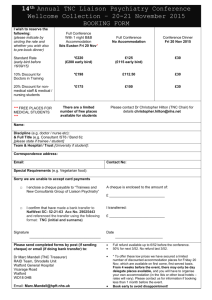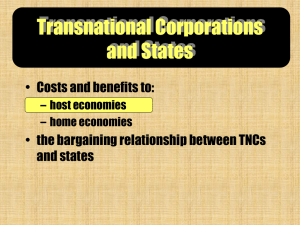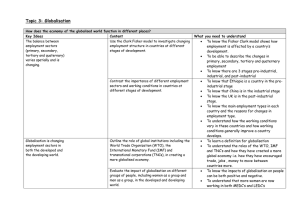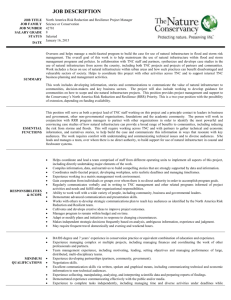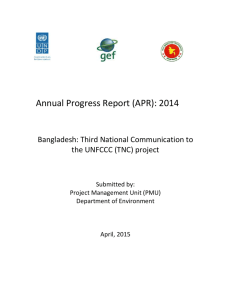PROMOTING SUSTAINABLE TNC/SME - LINKAGES
advertisement
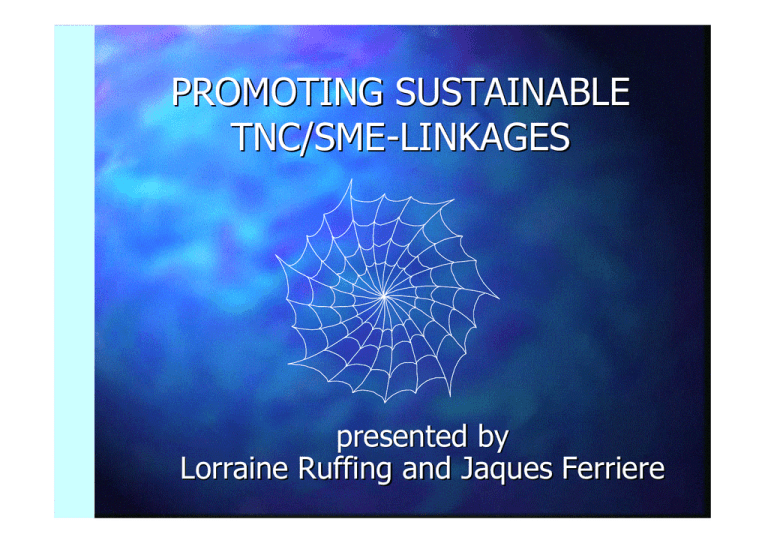
PROMOTING SUSTAINABLE TNC/SME-LINKAGES presented by Lorraine Ruffing and Jaques Ferriere TNC/SME-Linkages Motivations for TNCs to develop linkages with SMEs n TNCs focus on core activities and outsource of non-competitive activities n Reduced transaction and factor costs for TNCs through operations with local firms TNC/SME-Linkages Motivations for TNCs to develop linkages with SMEs n Increased flexibility / speed by off-loading some operations n Productivity gains TNC/SME-Linkages Backward linkages with suppliers Linkages and Spillovers between TNCs and SMEs Linkages with technology partners Forward linkages with customers Other spillover effects TNC/SME-Linkages n TNCs increasingly tend to perceive the the building up of SME supplier networks as a long-term investment TNC/SME-Linkages Transnational Corporations that carry out an Corporate Supplier Development Programmes: n Hitachi n Intel n Motorola n Philips n Toyota n Unilever n Anglo-American TNC/SME-Linkages n Linkages with transnationals have benefits for small and medium-sized enterprises but also some risks BENEFITS TNC/SME-Linkages n Technological and managerial upgrading of SMEs BENEFITS TNC/SME-Linkages n Facilitation of other business alliances n Transformation into internationalized SMEs BENEFITS TNC/SME-Linkages n Market access, guaranteed outlet for production n Information on market trends for SME strategic positioning BENEFITS TNC/SME-Linkages n Facilitated access to credit or other financial support BENEFITS TNC/SME-Linkages n Dynamic entrepreneurship, and specializaton by SMEs RISKS TNC/SME-Linkages n Overly dependent on the TNC customer n Caught in “cost down” market cycles imposed by TNC global players RISKS TNC/SME-Linkages n Exposure to constantly increasing non-trade barriers (high corporate and international quality standards) Partnerships for Sustainable Linkages Roles of Partners n Government: vision, commitment,policies (economic incentives, skill development) n TNCs: monitoring and coaching n SMEs: vision, commitment, financial stability n Support agencies: Global Supplier Programme Role of Government and support institutions in linkage development Business environment Robust educational system - Re-orientation for globalization - Political and economic stability - Multi skilled and agile workforce - Promote learning organization Financial Aids - Incentives - Tax exemptions Effective Policies -Encourage foreign investment -Encourage local supplier development Good Infrastructure - Access/ transportation - IT capability Industrial Promotion - Opportunities for linkages & networking (trade missions) - Foreign collaboration with local industries TNC/SME-Linkages Best practices in terms of TNC linkage programmes n access to TNC innovation centers and engineers/ consultants n assignment of TNC staff to SMEs, sharing of know-how n phased upgrading from SME plant layout to technological capabilities (design capability, flexible manufacturing, ISO certifications) TNC/SME-Linkages Best practices in terms of TNC linkage programmes n coaching and mentoring programmes n periodic evaluation and benchmarking n facilitate SME access to other business opportunities ! ! ! TNC/SME-Linkages UNCTAD’s Global Linkage Programme This project aims at assisting SMEs in: n stimulating vision/commitment of governments in developing countries n identifying both potential suppliers from among SMEs and TNCs that are open to forging linkages with SME partners TNC/SME-Linkages UNCTAD’s Global Suppliers Programme n providing guidance to governments on appropriate economic incentives that facilitate mutually beneficial linkages n starting coaching programmes with TNCs to upgrade SMEs technology and management n diffusing information on international best practices


